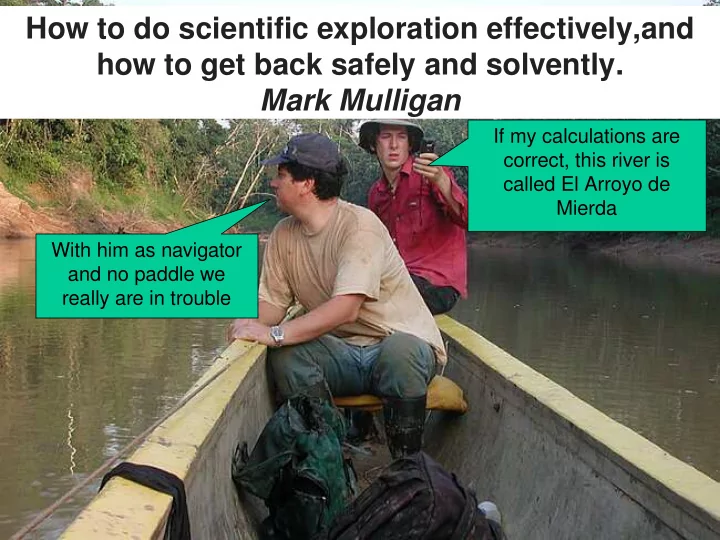

How to do scientific exploration effectively,and how to get back safely and solvently. Mark Mulligan If my calculations are correct, this river is called El Arroyo de Mierda With him as navigator and no paddle we really are in trouble
Where is left to explore? High resolution imagery in Google’s database
Where (and why) are people looking to explore? Purchases of DigitalGlobe imagery
logging for timber and paper deforestation for subsistence or commercial agriculture mining for metals and minerals oil and gas exploitation - lack of sustainable development whilst natural resources are plundered and local people remain in dire poverty. Partly because of politics and economics but partly also because of lack of knowledge of how to operationalise the concept of sustainability. Contribute.
Good expedition research should: • Have a clear, precise and single aim (no more than one). • Have << 10 objectives (what you will do to achieve the aim). • Think small not big. Leave yourself time. • Build upon existing research. Seek advice. • Be keen and enthusiastic – carry people with you. • Collect only the data necessary to fulfil the aim. • Collect enough good quality data for statistically meaningful hypothesis testing • Analyse the data using appropriate methods. • Conclude publicly as to what has been achieved and its wider relevance • Put results and data in the public domain
Types of expedition research Field experimentation/ Inventory – adding to the lists, detecting trends Impact evaluation- to understand socio- environmental processes Research frontiers - fitting it all together, Analytical Sampling / Observation / also with remote sensing, modelling and Survey / Classification / Mapping - to GIS produce baseline data and identify relationships
The tropical forest canopy is virtually unexplored (we know more about the Moon and Mars), yet most of all rainforest species are likely to live up here
But where? Somewhere you have been. Somewhere your tutor/department already works. Somewhere you have contacts in the field. Follow up a previous expedition. Anywhere : Field stations in the RGS-IBG World Register of Field Centres. Think about safety and security, stability, FCO advice. http://www.rgs.org/go
Fieldwork can be physically, mentally and socially challenging - yes a walk in a park but not a walk in the park Why didn ’ t I do a desk- based modelling PhD?
Living conditions can be basic, even compared with London student accommodation! Accomodation Restaurant and bar and medical centre …
Constraints Bear these in mind in choice of topic/location: (a) Your team ’ s background/skills & local support (b) The background/ previous research on topic (c) Equipment availability/data access (d) Resources available in the field and logistics (e) Sample export/import (f) Your reliance on others and what happens if no show (g) Time (h) Money (i) Last, but not least: safety and security
Working as a team and using each other ’ s skills is critical Where have all the students gone now the equipment has to be loaded up?
Expedition research timeline 70% 1 Define questions and location b4 2 Contact and engage overseas partners you go! 3 Produce aim and objectives 4 Define background, literature review and methodology 5 Design sampling frameworks/scales with consideration of statistical requirements (spatial and temporal scale, number of sites, measurements to be made at each site, location of sites). Apply for permissions/funding, ethical/risk assmnt. • Negotiate logistics incl. equipment. • Collect and analyse data • Interpret results • • Write report, send feedback to overseas partners!
Fieldwork planning • You are overseas: you only have one chance to get it right. • Test instruments, surveys and classifications beforehand. • Find out as much as possible about your site (GIS/RS). Have a backup plan. • Give yourself enough time to do a good job (given weather and other considerations). • Make sure you have safe and comfortable surroundings, keep ð . Have a checklist of what you will take with you. • • Reconnaissance can be very useful if you have the opportunity. • Keep a thorough and detailed field (paper) notebook. • Make backups of your notebooks and data before you come back home. • Expect the unexpected.
If you are plan carefully, work hard and luck is on your side you will collect lots of lovely data (smug grin)
But a swarm of bees (or anything else) can easily reverse that and you ’ ll have to deal with it This is not what I pay my fees for
What does the RGS-IBG (and most funding bodies) expect to see? 1.Bright, relevant idea by strong team with relevant skills. 2.Real involvement of host country nationals. 3.Research questions, aims and objectives clearly stated. 4.Clear contextual knowledge and understanding. 5.Appropriate methodologies explained carefully. 6.Well designed sampling frameworks. 7.Careful attention to safety and crisis management . 8.Sensitivity to host country needs (e.g. cultural sensitivities). 9.Clear preliminary thoughts on analysis. 10.Attention to detail and careful preparation. 11.Permissions and host country support. 12.More than a set of dissertations together.
• Good projects examine well developed questions and test well developed hypotheses • Good projects lie within constraints imposed by environmental, cultural, personnel characteristics • Good projects can develop results to wider relevance • 4. Good projects neither attempt to do too much nor reflect lack of effort Good luck :-) SLIDES : http://goo.gl/G9bE4 Questions?
How to get there solvently Google : RGS Grants 1. In the field for >=30 days 2. 3 or more people 3. Host country participitation 4. Deadline around mid Jan 5. Start planning now 6. Interview at RGS
Need more info or inspiration: Google : RGS Explore event (hurry)
Recommend
More recommend